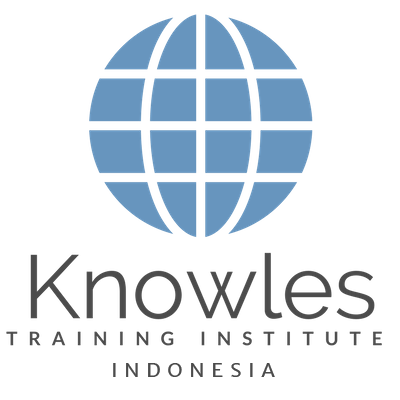Telephone Etiquette Training Course in Indonesia
Our corporate training course is also available in Jakarta, Surabaya, Bandung, Bekasi, Medan, Tangerang, Depok, Semarang, Palembang, Makassar, South Tangerang (Tangerang Selatan), Batam, Bogor, Pekanbaru, Bandar Lampung, Padang, Malang, Surakarta (Solo), Balikpapan, Denpasar, Samarinda, Cimahi, Yogyakarta, Banjarmasin, Serang, Jambi, Pontianak, Manado, Mataram, Batu, Ubud (Bali), Bali, Lombok, Surakarta, Manado, Makassar, Semarang, Balikpapan.
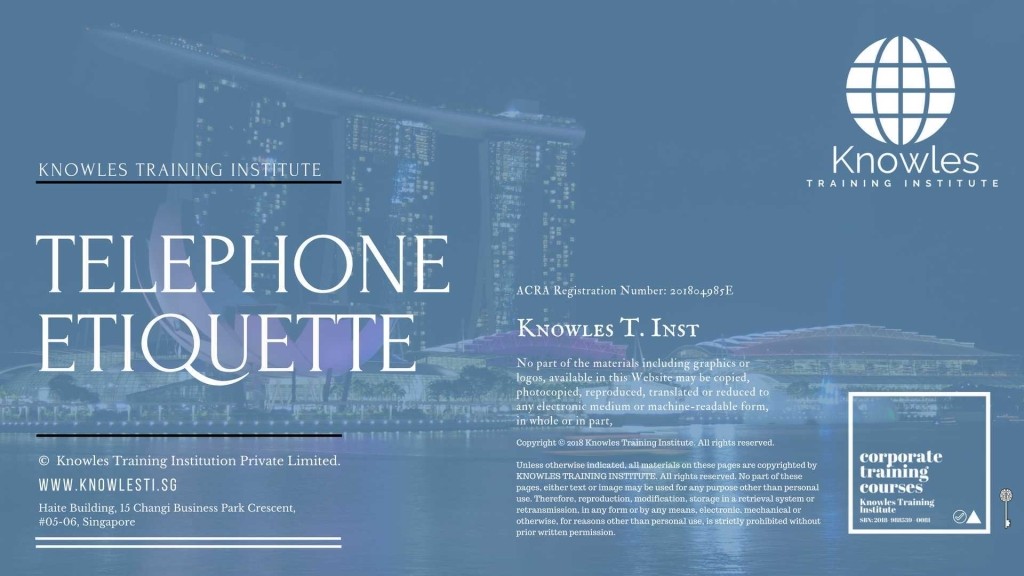
About This Telephone Etiquette Training Course in Indonesia
Telephone Etiquette Course in Indonesia
About This Course
In most of today’s business, the first contact with clients is usually through calls or text. Hence, telephone etiquette cannot be neglected. Transactions over the phone could offer countless possibilities for business. As a marketing strategy, it could attract a large demographic of customers. Incompetent or rude employees could result in dissatisfied or offended customers while polite and reliable ones encourage customers to avail of the services again.
There is a reason why, despite the options of leaving a message through e-mail or any social media sites, many callers still prefer the use of direct calls. Calls provide prompt, straightforward answers without taking the time to read a mile-long manual or understanding difficult instructions. Some people are auditory in gaining information or learning. Hearing from a competent voice is easier to take in and answers inquiries faster.
Telephone etiquette is not limited to telephone use only. With the present technology advancing the role of customer service, these etiquettes can be employed in any digital contact with the business. Learning these skills will give a big impact to the reputation of a company.
Who Should Attend This Telephone Etiquette Course in Indonesia Workshop
This Telephone Etiquette Course in Indonesia workshop is ideal for anyone who would like to gain a strong grasp and improve their Telephone Etiquette.
All Staff Within An Organisation
Managers
Team Leaders
Executives
Assistants
Officers
Secretaries
Group Size For This Telephone Etiquette Training Program in Indonesia
The ideal group size for this Telephone Etiquette course in Indonesia is:
Minimum: 5 Participants
Maximum: 15 Participants
Course Duration For This Telephone Etiquette Skills Course in Indonesia
The duration of this Telephone Etiquette workshop in Indonesia is 2 full days. Knowles Training Institute Indonesia will also be able to contextualised this workshop according to different durations; 3 full days, 1 day, half day, 90 minutes and 60 minutes.
2 Full Days
9 a.m to 5 p.m
Telephone Etiquette Course in Indonesia Benefits
Below is the list of course benefits of our Telephone Etiquette course in Indonesia
Telephone Etiquette Training Course in Indonesia Benefits – Part 1
- Develops the participant’s tactfulness and courteousness which are key traits in telephone etiquette.
- Leaves a good impression of the company and individually on the caller.
Telephone Etiquette Training Course in Indonesia Benefits – Part 2
- Increases the number of clients, prospective clients, and repeat orders due to persuasive, helpful, and engaging call handlers.
- Develops the participant’s skill in mediating and resolving conflicts with diplomacy.
Telephone Etiquette Training Course in Indonesia Benefits – Part 3
- Makes the callers or customers feel valued with the company, which in turn increases sales.
- Enhances the participant’s preparedness and proficiency in anticipation of different kinds of callers.
Telephone Etiquette Course in Indonesia Objectives
Below is the list of course objectives of our Telephone Etiquette course in Indonesia
In this developing electronic age, we often forget the importance of basic telephone etiquette. Outside the domain of texting and emails, many individuals still use the telephone as a main source of communication. Understanding conventional phone etiquette and procedures for speaking with someone on the telephone can confer a distinguished deal of professionalism as well as social knowledge.
Telephone Etiquette Course in Indonesia Objectives- Part 1
- Understand the various aspects of telephone language.
- Correctly manage inbound/outbound calls.
Telephone Etiquette Course in Indonesia Objectives- Part 2
- Understand how to manage angry or rude callers.
- Learn to take and send phone messages effectively.
- Understand different techniques of employee training.
Course Content For This Telephone Etiquette Training Course in Indonesia
Below is the list of course content of our Telephone Etiquette training course in Indonesia
Telephone Etiquette Training Course in Indonesia – Part 1: Perspectives of Phone Etiquette
Many people do not realise they have little or no phone etiquette. When they realise this, they are often unsure about where to start. One of the initial steps to gaining or developing an individual’s phone etiquette is to understand the diverse aspects of it, such as phrasing and listening skills. Acquiring this knowledge can be a great beginner tool for many people and can help them feel more self-confident on the phone immediately.
- Phrasing
- When speaking on the telephone, a distinct set of phrasing is used rather of our every day talking phrases.
- Tone of Voice
- Our tonality of voice in which we speak can represent a variety of emotions.
- Speaking Clearly
- Listen to the Caller
Telephone Etiquette Training Course in Indonesia – Part 2: Using Proper Phone Language
Every situation we enter demands a different form of ‘language’. For example, we wouldn’t enter a team meeting with the same type of communication we may use in the break room. The equivalent is true for the telephone. Telephone language is distinct from our everyday language and can take some time to get used to its run. However, with the appropriate techniques, it can be easy to adjust in no time.
- Please and Thank You
- Using good etiquette is a way to show respect and kindness to those we interact with.
- Do Not Use Slangs or Singlish
- Slang is typically characterised as a type of language that consists of words and phrases that are viewed as very informal and are employed in everyday speech.
- Avoid Using the Term “You”
- When conversing with someone on the telephone, it can be comfortable to get lost in speaking with the caller and letting them know what they may require to do on their end.
- Highlight What You Can Do, Not What You Can’t
- When we are speaking with someone on the phone, for any purpose, it can be difficult to communicate what the caller requires or needs from the operator.
Telephone Etiquette Training Course in Indonesia – Part 3: Reduce Phone Distractions
Distractions can be prevalent in an office environment. Since operators are not alone, it is vital to learn to adjust to the sounds of other people in the room, telephones ringing or even the ‘walk-in’ visitor into our work station. Nevertheless, if we let these distractions interrupt our telephone conversation, this will cause us to seem inexperienced and unprofessional.
- Avoid Eating or Drinking
- It is a standard practice to have something at our desk to sip on or snack on during the day.
- Minimize Multi-Tasking
- Eliminate Office Distractions
- Distractions are all around us, and we might not even be aware of it.
- Do Not Let Others Interrupt You
- When we work in an office setting, it’s not unusual to have coworkers around our workstation that may interrupt you.
Telephone Etiquette Training Course in Indonesia – Part 4: Inbound Calls
For many organisations, inbound calls are a significant part of the business. Customer calls into the company for orders, consultations and even inquiring general information. Inbound calls may seem frightening at times since we are unsure of the questions that the other party may request for. However, understanding the right techniques of telephone etiquette can help the telephone operator throughout any situation.
- Avoid Long Greeting Messages
- For inbound calls, every organisation has its own set of greetings or scripting to use when they answer the phone.
- Introduce Yourself
- When a person calls into your office, they may not necessarily know who or even what company they are calling into.
- Focus on Their Needs
- One of the most crucial aspects of business is to maintain its customers, and one of the best ways to do that is to focus on the customer’s needs.
- Be Patient
- Inbound calls can be long and tiresome for the operator. In these calls, the client is calling into the organisation and will start making demands right away.
Telephone Etiquette Training Course in Indonesia Part 5: Outbound Calls
Outbound calls can be some of the most difficult types of calls to make. They demand that the caller be fully prepared and be able to keep the ‘client’ engaged while attempting to deliver a point.
- Be Prepared
- During outbound calls, it is necessary to have all of your information prepared and available before you dial the number.
- Identify Yourself and Your Company
- Give Them the Reason for the Call
- Keep Caller Information Private
Telephone Etiquette Training Course in Indonesia – Part 6: Handling Rude or Angry Callers
One of the most difficult, and somewhat scariest, situations is when a telephone operator has a rude or angry caller.
- Stay Calm
- Staying calm with an angry or rude called can be one of the hardest tasks a phone operator must do.
- Listen to Their Needs
- When we face rude or angry callers, our first impulse is to stop listening to what they have to say due to their bad mood.
- Never Interrupt
- When a person is interrupted while they are speaking, it can make them grow even more irritated or frustrated.
- Identify What You Can Do for Them
- When a customer is mad or upset, the last thing they want to hear from the organisation is what cannot be done for them for the issues that they are facing.
Telephone Etiquette Training Course in Indonesia – Part 7: Handling Interoffice Calls
When handling calls with the general public, there are a set of guidelines and procedures that the telephone operator follows.
- Transferring Calls Correctly
- Placing Callers on Hold Appropriately
- Placing a caller on hold for too long can make them feel neglected.
- Taking Messages
- Although departments may not require employees to take a message down, the occasion may arise.
- End the Conversation
- Sometimes completing a call with someone can be awkward. Learn how to end the phone conversation appropriately.
Telephone Etiquette Training Course in Indonesia – Part 8: Handling Voicemail Messages
Voicemails are an excellent tool to have in this age of technology, particularly since the employee may not be at their desk all the time, or maybe busy accepting calls from another customer. It is essential to understand how to retrieve and deliver these voicemails efficiently.
- Ensure the Voicemail Has a Proper Greeting
- When creating your own voicemail, it is necessary to have a proper greeting message for your callers to hear suitable for your business.
- Answer Important Messages Right Away
- A voicemail can carry many messages at once from various sources.
- Ensuring Messages Taken are Delivered to the Right Person
- Things To Take Note of Leaving a Message for Others
- Leaving a voicemail message for someone may feel difficult to do, especially for those not used to it.
Telephone Etiquette Training Course in Indonesia – Part 9: Training Others Telephone Etiquette
While having excellent telephone etiquette is useful, it will not do any good if it is not trained to the rest of the telephone operators.
- Conducting Group Training Effectively
- One-on-One Training
- One-on-one training typically includes the employee being trained on an individual basis.
- Peer Training
- Although peer training is a program that is not used as often as other training methods, it is still a valuable tool when training a small group of telephone operators.
- Job Shadowing The Right Way
Telephone Etiquette Training Course in Indonesia – Part 10: Correcting Poor Telephone Etiquette
- Screening Calls
- Many businesses that offer a telephone service have undertaken the support of some sort of call monitoring service.
- Employee Evaluations
- Individual employee evaluations are another excellent tool for evaluating and improving any instance of poor telephone etiquette.
- Peer Monitoring
- Peer monitoring is a method of assessment that is useful for improving telephone etiquette among employees.
- Customer Surveys
- Another system of evaluating employee telephone etiquette is through an employee-customer/client survey.
Telephone Etiquette Course in Indonesia Value Added Materials
Each participant will receive the following materials for the Telephone Etiquette course in Indonesia
Telephone Etiquette Course in Indonesia Learner’s Guide
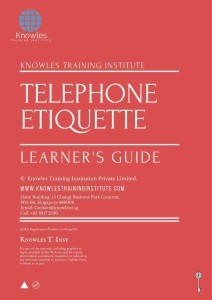
Telephone Etiquette Course in Indonesia Handouts
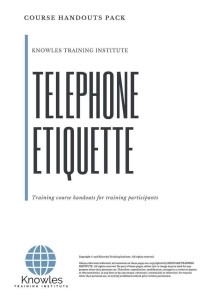
Telephone Etiquette Course in Indonesia PPT Slides Used During Course
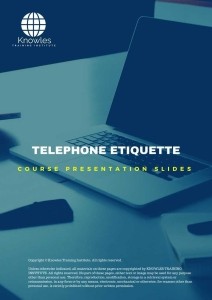
Telephone Etiquette Course in Indonesia Certification
Each course participant will receive a certification of training completion
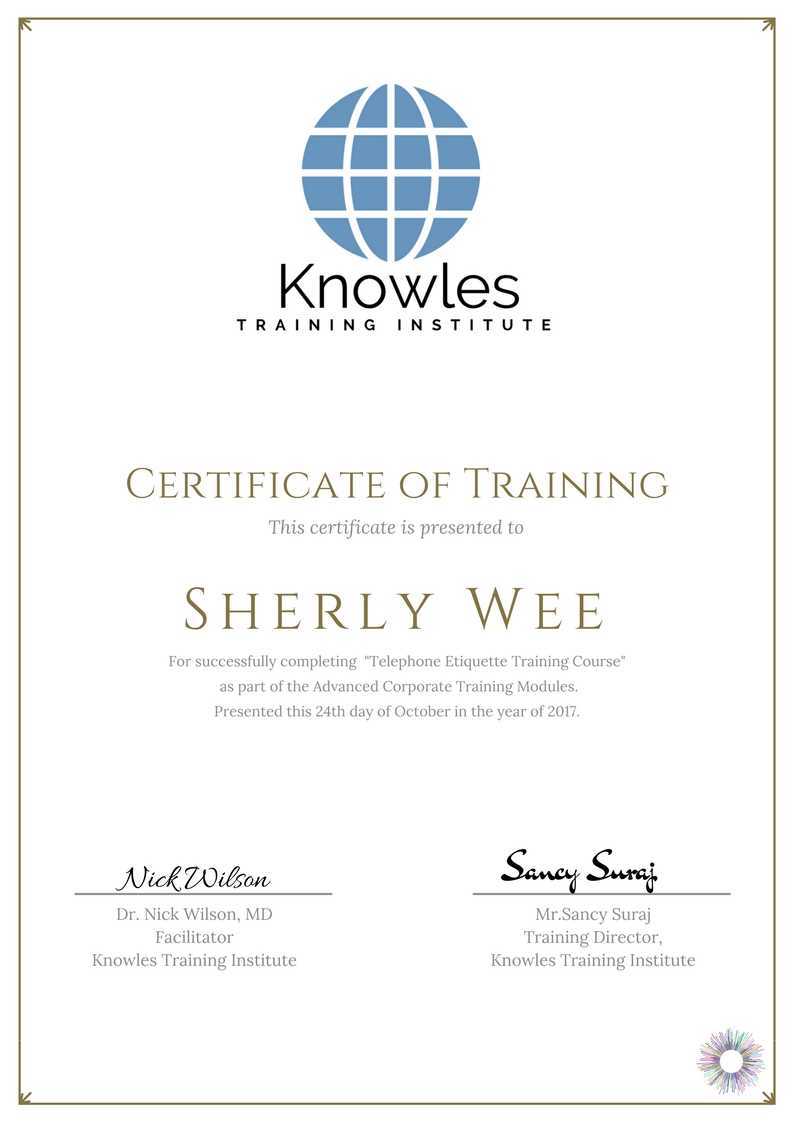
Courses Fees For Telephone Etiquette Training Course in Indonesia
There are 4 pricing options available for this Telephone Etiquette training course in Indonesia . Course participants not in Indonesia may choose to sign up for our online Telephone Etiquette training course in Indonesia .
- USD 1,019.96 For a 60-minute Lunch Talk Session.
- USD 389.96 For a Half Day Course Per Participant.
- USD 629.96 For a 1 Day Course Per Participant.
- USD 854.96 For a 2 Day Course Per Participant.
- Discounts available for more than 2 participants.
Upcoming Telephone Etiquette Training Course in Indonesia
Schedule
Schedule
Contact us for the latest Telephone Etiquette course in Indonesia schedules:
Email: contact@knowlesti.id
Message:
Download Telephone Etiquette Course in Indonesia Brochure
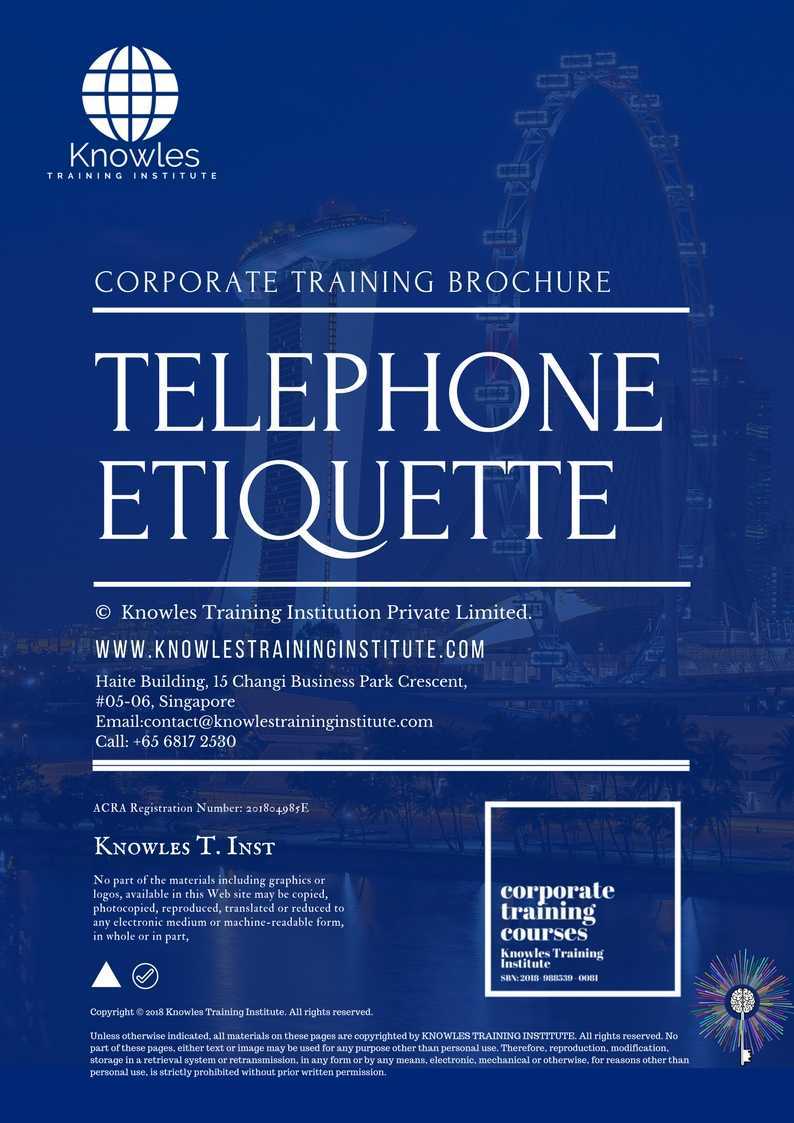
Request for this Telephone Etiquette course in Indonesia brochure. Fill up the short information below and we will send it to you right away!
Post Training Support: A vast majority of training does not have any effect beyond 120 days. To work, training has to have a strong pre- and post-training component. Post-training reinforcement helps individuals to recall the understanding and ask questions.
Blended Learning: Learning does not occur in the classroom. Virtually everybody prefers distinct ways of learning. Successful learning should have a multi-channel, multi-modal strategy.
- We Understand The Industry: We’ve got a profound comprehension of the business, business design, challenges, strategy and the that our participants are in and have designed the courseware to cater to their professional needs.
- Course Content: Knowles Training Institute’s material is relevant, of high quality and provide specific learning results. Participants will leave the training course feeling as they have gained a strong understanding and will also be in a position to execute what they have learned sensibly.
Course Development — The workshop modules follow a systematic and logical arrangement. This structure helps to ensure that the course material allows the facilitators to deliver the course in a logical arrangement. Consider the subjects as building bricks into learning, our facilitators slowly build towards a comprehensive picture of this entire topic.


Course Enquiries

Fill up the form and we will get back to you in less than 1 working day.
Alternatively, give us a call to have one of our training consultants contact you. Our corporate training courses can be contextualized to meet your organization’s training needs. Leverage on our large pool of professional trainers and consultants for your organization’s training needs.
Email: contact@knowlesti.id
We Guarantee 100% Privacy. We Respect Your Privacy. Your Information Will Never Be Shared.
